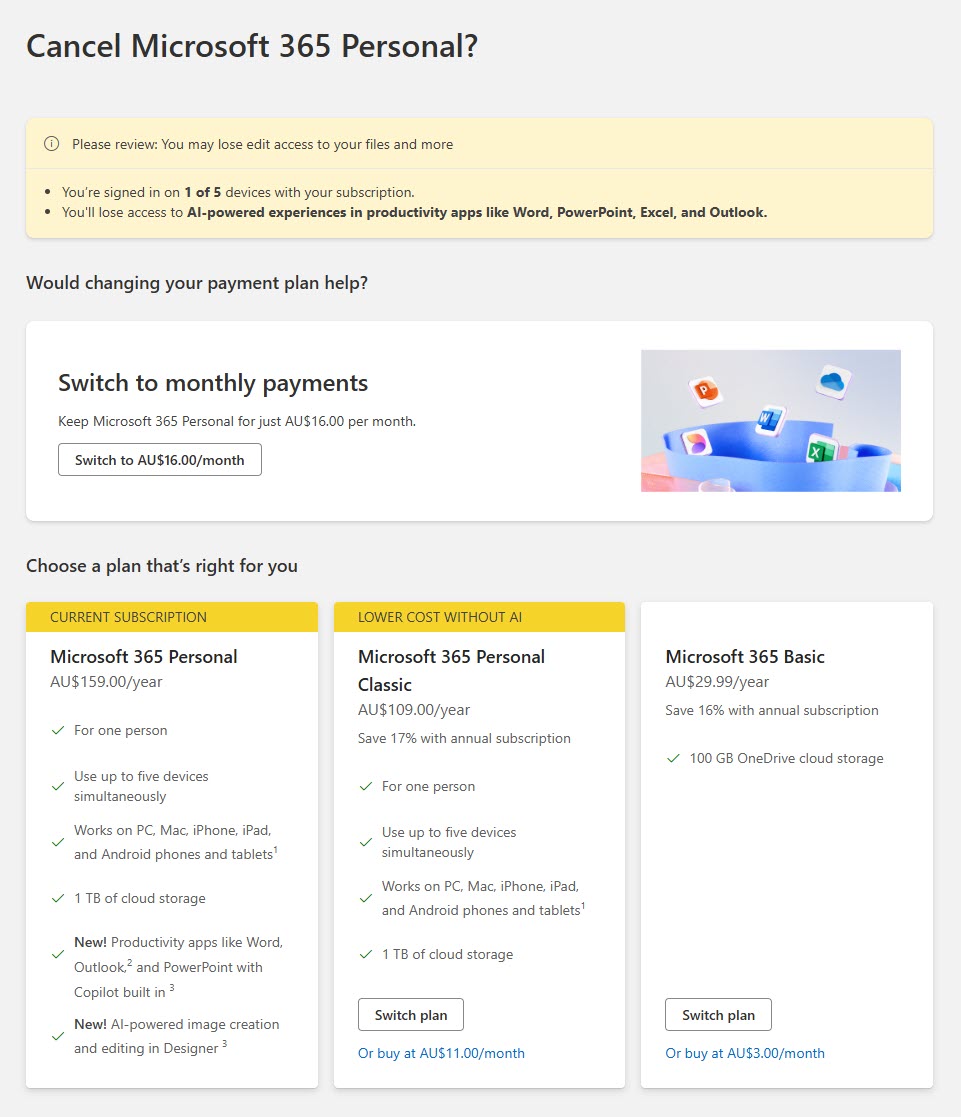Microsoft faces court over alleged Copilot deception of 2.7 million
Australian regulator alleges tech giant concealed subscription options while integrating AI assistant into Microsoft 365 plans at higher prices.

The Australian Competition and Consumer Commission has initiated Federal Court proceedings against Microsoft Corporation and Microsoft Pty Ltd on October 27, 2025, alleging the companies misled approximately 2.7 million Australian customers about subscription options following the integration of its Copilot AI assistant into Microsoft 365 Personal and Family plans. The regulatory action centers on claims that Microsoft deliberately concealed an alternative subscription tier to push consumers toward more expensive AI-integrated offerings.
According to the ACCC's concise statement filed with the Federal Court, Microsoft informed subscribers with auto-renewal enabled that maintaining their subscription required either accepting Copilot integration at substantially higher prices or canceling their subscription entirely. However, the regulator alleges a third option existed: Microsoft 365 Personal or Family Classic plans that allowed subscribers to retain their existing features without Copilot at previous pricing.
Subscribe PPC Land newsletter ✉️ for similar stories like this one. Receive the news every day in your inbox. Free of ads. 10 USD per year.
"Following a detailed investigation, we will allege in Court that Microsoft deliberately omitted reference to the Classic plans in its communications and concealed their existence until after subscribers initiated the cancellation process to increase the number of consumers on more expensive Copilot-integrated plans," ACCC Chair Gina Cass-Gottlieb stated in the commission's media release.
The commission's investigation found that Microsoft never mentioned Classic plans in its communications to subscribers. The only method to access these plans required navigating to the subscriptions section of a Microsoft account and selecting "Cancel subscription." Only on the subsequent page did subscribers receive the option to switch to the Classic plan instead of canceling.
Price increases and communication timeline
On October 31, 2024, Microsoft published a blog post announcing that AI features would be integrated across Microsoft 365 Personal and Family subscriptions, with price increases applying to existing subscribers at their next renewal. The integration represented what Microsoft described as the "next step in our Copilot journey," bringing AI capabilities to productivity applications including Word, Excel, PowerPoint, Outlook, and OneNote.

The price adjustments proved substantial. Annual subscription fees for Microsoft 365 Personal increased 45 percent from $109 to $159, while monthly fees rose from $11 to $16. For Microsoft 365 Family plans, annual subscriptions increased 29 percent from $139 to $179, with monthly fees climbing from $14 to $18.
Between October 31, 2024 and January 31, 2025, Microsoft sent an initial email to approximately 2.7 million subscribers at least 30 days before their renewal date. This first email, titled "Upcoming price change for your Microsoft 365 subscription," stated that prices were being adjusted "to continue evolving the benefits included with your subscription and ensure Microsoft customers are among the first to access powerful AI features in our apps."
The communication specified that starting on April 19, 2025, the new price would apply unless consumers canceled or turned off recurring billing at least two days before their next billing date. It concluded that continuing the subscription would maintain access to "secure cloud storage, advanced security for your data and devices, AI-powered features, along with all your other subscription benefits."
A second email arrived seven days before renewal dates, beginning in mid-November 2024. This message, headed "Important update about your Microsoft 365 Personal subscription," reiterated that the increased price would be charged unless the consumer canceled two days before their renewal date. Neither communication referenced the existence of Classic plans.

Alleged violations and consumer impact
The ACCC's case rests on violations of the Australian Consumer Law. The commission alleges Microsoft engaged in misleading or deceptive conduct under Section 18, made false or misleading representations about prices under Section 29(1)(i), misrepresented the need for services under Section 29(1)(l), and made false representations about the existence of rights under Section 29(1)(m).
According to the ACCC's concise statement, Microsoft's two emails and blog post were "false or misleading as they conveyed that consumers had to accept the more expensive Copilot-integrated plans, and that the only other option was to cancel." The representations were partly express and partly implied, with the implication arising from the failure to mention any alternative option and from consumers' reasonable expectation that such options would be disclosed.
The commission believes millions of Australian consumers who were allegedly misled about the availability of Classic plans may have suffered economic harm through automatic renewal of subscriptions with Copilot integration at higher prices. The ACCC seeks consumer redress for affected Microsoft 365 Personal and Family subscribers, along with penalties, injunctions, declarations, and costs.
"The Microsoft Office apps included in 365 subscriptions are essential in many people's lives and given there are limited substitutes to the bundled package, cancelling the subscription is a decision many would not make lightly," Cass-Gottlieb explained. "We're concerned that Microsoft's communications denied its customers the opportunity to make informed decisions about their subscription options, which included the possibility of retaining all the features of their existing plan without Copilot and at the lower price."
Buy ads on PPC Land. PPC Land has standard and native ad formats via major DSPs and ad platforms like Google Ads. Via an auction CPM, you can reach industry professionals.
Investigation origins and evidence
The ACCC drew on a significant number of consumer reports and commentary in online forums such as Reddit when establishing its investigation. Information provided by consumers to the ACCC's Infocentre proved critical in alerting the commission to the alleged conduct, particularly in identifying the availability of Classic plans through subscribers' cancellation flows.
The case involves Microsoft Corporation, the US-based technology conglomerate responsible for preparing and publishing the communications to Australian Microsoft 365 subscribers, and Microsoft Pty Ltd, the Australian subsidiary that supplied Microsoft 365 plans to Australian consumers. The ACCC alleges Microsoft Corporation prepared the communications containing the alleged misrepresentations, while Microsoft Pty Ltd adopted these communications as the seller of subscriptions to Australian consumers.
The proceedings relate exclusively to Microsoft 365 Personal and Family plans designed for home use. The case does not involve Microsoft 365 subscriptions for business or enterprise customers.
Copilot integration and market context
Microsoft launched Copilot as its consumer-facing generative AI product in 2023. The AI assistant was integrated into Microsoft 365 Personal and Family subscriptions in Australia on October 31, 2024, with the worldwide rollout occurring in January 2025. Different jurisdictions received varying subscription price increases.
The integration came as Microsoft expanded its AI capabilities across its product ecosystem. Microsoft's advertising business had surpassed $20 billion in annual revenue by April 2025, with the company introducing new Copilot-powered advertising formats and capabilities. Research published by Microsoft Advertising showed Copilot achieving 73 percent higher click-through rates compared to traditional search advertising, with data spanning November 2024 through May 2025.
The company had also launched Copilot Search in Bing on April 4, 2025, combining traditional search functionality with generative AI capabilities. In August 2025, Microsoft integrated OpenAI's GPT-5 model across Microsoft 365 Copilot, prompting commentary from Elon Musk that "OpenAI is going to eat Microsoft alive."
Regulatory context and penalties
The enforcement action represents part of the ACCC's focus on competition, product safety, consumer and fair trading issues in the digital economy, identified as a current compliance and enforcement priority. The case follows the regulator's broader scrutiny of subscription-related practices.
In September 2025, the ACCC took JustAnswer to court over alleged subscription traps and misleading pricing, with Deputy Chair Catriona Lowe characterizing that case as addressing "manipulative online design practices which guide consumers to sign up for subscriptions they do not want or did not intend to buy."
The JustAnswer enforcement aligned with findings published by the ACCC in March 2025 showing 72 percent of Australian consumers encountered potentially unfair practices across digital marketplaces. The commission's Digital Platform Services Inquiry identified subscription traps as a persistent consumer harm, where businesses mislead consumers about subscription terms.
For corporations, the maximum penalty for each breach of the Australian Consumer Law stands at the greater of $50 million, three times the total benefits obtained and reasonably attributable to the conduct, or if the total value cannot be determined, 30 percent of the corporation's adjusted turnover during the breach turnover period. Any penalties remain subject to the Court's determination based on its findings.
Industry implications for marketers
The case carries significant implications for digital marketing and subscription-based business models. Microsoft's alleged conduct demonstrates how platform providers with market dominance can leverage product integration to influence consumer choices through information asymmetry. The Office applications included in Microsoft 365 subscriptions face limited direct substitutes in the bundled format, creating switching costs that make cancellation decisions more complex.
The controversy emerges as subscription models proliferate across digital services, from streaming platforms to productivity software. Transparency requirements for subscription pricing and options have become focal points for regulators globally, with enforcement actions targeting what authorities characterize as dark patterns or manipulative design practices.
For marketing professionals, the case underscores the legal risks associated with incomplete disclosure of pricing options, particularly when introducing higher-tier offerings with mandatory feature additions. The ACCC's investigation methodology, drawing on consumer reports and online forum commentary, illustrates how regulatory bodies now monitor digital platforms through crowdsourced intelligence alongside formal complaints.
The Microsoft case also highlights tensions between AI integration strategies and consumer choice. While Microsoft positioned Copilot as an enhancement justifying price increases, the alleged concealment of non-AI alternatives suggests concern that consumers might reject AI features if given transparent options. This dynamic could influence how other technology companies approach AI feature rollouts and pricing structures.
The regulatory action occurs as AI capabilities become standard across productivity software, raising questions about whether consumers should have the option to reject AI features and corresponding price increases when alternatives exist. Microsoft's approach of hiding the Classic option within cancellation flows suggests an expectation that explicit disclosure would reduce AI adoption rates.
Current options for affected subscribers
The ACCC notes that existing Microsoft 365 Personal and Family subscribers who have not had their subscription renewed since August 7, 2025 and would like to revert to their previous plan may be able to select the cancel option and follow the steps in the cancellation process until the Classic plan is offered. However, the commission emphasizes that subscription options and prices offered remain entirely in Microsoft's control and could change at any time.
Microsoft's alleged conduct violated consumer law provisions specifically because the Classic Option existed but was deliberately hidden from standard communications. The company communicated the impending changes through two emails and a blog post, none of which mentioned the possibility of maintaining the subscription without AI integration at the lower price.
The commission's investigation revealed that the Classic plans were only accessible after initiating cancellation, requiring subscribers to navigate to their account subscriptions section, select "Cancel subscription," and then proceed to a subsequent page where the Classic plan option finally appeared. This multi-step process effectively served as a barrier to accessing the lower-priced alternative.
For subscribers who auto-renewed at the higher price without knowledge of the Classic option, the ACCC believes they may have suffered economic harm equal to the price difference between the AI-integrated and Classic plans. The commission seeks redress for these affected consumers through its Federal Court proceedings.
Looking ahead
The Federal Court proceedings will determine whether Microsoft's conduct violated Australian Consumer Law and, if so, what penalties and remedies apply. The case could establish precedents for how technology companies must disclose subscription alternatives when introducing mandatory feature upgrades with associated price increases.
Microsoft has not publicly commented on the specific allegations in the ACCC's concise statement. The company must now respond to the commission's claims through the Federal Court process, which will examine the evidence regarding its communications to subscribers and the availability of Classic plans.
For the approximately 2.7 million Australian subscribers affected by the alleged conduct, the case represents potential financial redress if the ACCC's claims succeed. The proceedings also serve as a test case for regulatory approaches to subscription transparency in an era of increasing AI integration across consumer software.
The outcome could influence how other major technology platforms communicate pricing changes and alternative subscription tiers to consumers, particularly when introducing AI features that justify higher prices. Regulators globally are watching as enforcement actions against subscription practices multiply, suggesting a coordinated approach to protecting consumer choice in digital marketplaces.
Subscribe PPC Land newsletter ✉️ for similar stories like this one. Receive the news every day in your inbox. Free of ads. 10 USD per year.
Timeline
- October 31, 2024: Microsoft publishes blog post announcing Copilot integration across Microsoft 365 Personal and Family subscriptions in Australia, with price increases to apply at subscribers' next renewal
- October 31, 2024 - January 31, 2025: Microsoft sends first email to approximately 2.7 million existing auto-renewal subscribers, at least 30 days before their renewal dates, communicating price increases without mentioning Classic plans
- Mid-November 2024 onwards: Microsoft sends second email to subscribers seven days before renewal dates, reiterating price increases without referencing Classic option
- January 2025: Copilot integration rolls out across Microsoft 365 worldwide with varying subscription price increases by jurisdiction
- March 2025: ACCC publishes findings showing 72 percent of Australian consumers encountered potentially unfair practices across digital marketplaces, identifying subscription traps as persistent consumer harm
- April 19, 2025: Price increases begin taking effect for subscribers as their renewal dates arrive
- April 30, 2025: Microsoft announces advertising revenue has surpassed $20 billion with AI integration driving growth across its platform
- August 2025: Microsoft integrates GPT-5 across Copilot platforms, marking significant AI capability expansion
- September 2025: ACCC takes JustAnswer to court over alleged subscription trap and misleading pricing, demonstrating regulator's focus on subscription-related practices
- October 27, 2025: ACCC commences Federal Court proceedings against Microsoft Corporation and Microsoft Pty Ltd, alleging misleading conduct affecting approximately 2.7 million Australian consumers
Subscribe PPC Land newsletter ✉️ for similar stories like this one. Receive the news every day in your inbox. Free of ads. 10 USD per year.
Summary
Who: The Australian Competition and Consumer Commission has initiated Federal Court proceedings against Microsoft Corporation (the US-based parent company) and Microsoft Pty Ltd (the Australian subsidiary). The case affects approximately 2.7 million Australian subscribers of Microsoft 365 Personal and Family plans who had auto-renewal enabled as of October 31, 2024.
What: The ACCC alleges Microsoft engaged in misleading or deceptive conduct by telling subscribers they must either accept Copilot AI integration at higher prices or cancel their subscriptions, while deliberately concealing a third option—Classic plans that maintained existing features without AI at previous prices. The commission claims Microsoft violated multiple provisions of the Australian Consumer Law, including prohibitions against misleading conduct and false representations about prices and service requirements.
When: The alleged conduct began on October 31, 2024, when Microsoft announced Copilot integration and sent the first of two emails to subscribers. Price increases started taking effect on April 19, 2025, as subscribers reached their renewal dates. The ACCC filed its concise statement with the Federal Court on October 27, 2025, marking the formal commencement of legal proceedings.
Where: The case takes place in the Federal Court of Australia, New South Wales District Registry, General Division. The alleged conduct affected Australian consumers who subscribed to Microsoft 365 Personal or Family plans for home use (not business or enterprise subscriptions). Classic plans were only accessible through a hidden cancellation flow within Microsoft account settings, never mentioned in the company's blog post, emails, or storefront webpages.
Why: The ACCC initiated proceedings because it believes Microsoft deliberately omitted reference to Classic plans to increase the number of consumers on more expensive Copilot-integrated subscriptions. ACCC Chair Gina Cass-Gottlieb stated that Microsoft's communications denied customers the opportunity to make informed decisions about subscription options. The commission seeks penalties, injunctions, declarations, consumer redress, and costs, arguing that consumers suffered economic harm by accepting automatic renewal at higher prices without knowledge of the lower-priced alternative. The case represents part of the ACCC's broader enforcement focus on subscription-related practices and manipulative design patterns in digital marketplaces.

